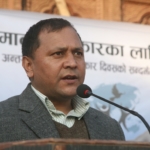We advise you to think beyond the “engineering model of urban development” and embrace the idea of “social engineering model of development”, which stands for taking into account social, economic, ecological, cultural and human implications of a development initiative.
Dear Mayor Balendra Shah (aka Balen),
We are just recalling how wholeheartedly your electoral victory to the mayoral position of the Kathmandu Metropolitan City was celebrated by people from all quarters in May 2022. Not only the people in Kathmandu but many Nepalis in general throughout the country and abroad had pinned very high hopes on you.
Though not the voters of Kathmandu, we were among those who had wished for your victory. It was because you, as an independent mayoral candidate, with the demonstrated commitment to serve the people as an elected official, had succeeded to justify your candidacy as a viable alternative to the traditional partition candidates.
After assuming your office, you had made a good start by allowing access to the media to the executive meeting. You went straight on to try and resolve Kathmandu’s long standing solid waste management problems. You also innovatively explored solutions to the crisis of public toilets in different parts of Kathmandu by convincing the private sector to allow public use of their sanitation facilities. You also came up with an idea of “infrastructure ambulance” as a sensible response to the widespread problems of maintenance works.
However, the subsequent decisions and actions of the Metropolitan Government under your leadership have attracted public controversies one after another.
Your intention to restore the Tukucha stream to its natural form was not wrong in itself. But, prior to digging the ground at the Jaya Nepal Cinema Hall, you should have consulted the relevant stakeholders including the Department of Archaeology and conducted a thorough study of the ground-reality of Tukucha in order to understand the viability of its restoration. The unplanned and haphazard attempt unnecessarily embroiled you into widespread criticism.
As a matter of priority, you signed an agreement dated 25 August 2022 between the Kathmandu Metropolitan City and the National Land Commission (a federal entity) to jointly conduct a verification of landless “squatters” and unmanaged dwellers in Kathmandu. That undoubtedly was your legitimate move given the fact that the local government also shares the legal obligation to resolve the problems of landless “squatters” in a sustainable way.
However, you put aside the agreement instead of prioritizing it. You rather went on to respond to the “request” made by the High Powered Committee for Integrated Development of the Bagmati Civilization by mobilizing the metropolitan police authority to bulldoze the habitats of the “squatters” in the Thapathali area. Such attempted bulldozing invited a violent clash between the settlers and the Metropolitan police personnel.
As the executive head of the Kathmandu Metropolis, you were supposed to think through, learn lessons from the earlier failed attempts and explore more legitimate and sustainable options – including by extending the necessary cooperation to the National Land Commission to complete the verification process promptly, and then to carry out a lawful eviction only after offering a suitable alternative of housing facility to those identified as landless households.
Instead, your office subsequently wrote a letter to the home minister, requesting for reinforcement of the police to carry out these evictions. This forced, and by “hook or crook” approach is meant to invite massive human rights abuses the metropolitan and federal government will have to be answerable to. We are not quite sure how the home ministry is responding to your request, but, as a federal authority, the home ministry cannot and must not go against the lawful verification process initiated by the National Land Commission.
Of course, no law bars the municipal government from carrying out “lawful evictions” for the public purpose. However, you need to be mindful that “unlawful” or “arbitrary” evictions of families from their habitats (which are protected under human rights and humanitarian laws regardless of the informality of the tenure-ship) without offering them adequate alternatives will constitute a serious violation of human rights. The arbitrary notification published in the media by warning the settlers to dismantle the structures they had created and leave the place in no way satisfies the “due process of law” requirement. There should be a proper verification process to bring to the knowledge of the State to ascertain how many families live there because of the need (due to the lack of alternative) and how many have created structures because of their greed (with the intent to amass property). There is no denying that the State cannot and must not serve greed. However, it must serve the needs of its people. If it is not possible for the State to ensure betterment, it must adhere to the “duty to respect human rights” by refraining from arbitrary evictions that render people homeless and thereby deprive them of their source of livelihoods. There is no legal exemption for the municipal government as it is also a part of the State.
Your unilateral plan to build a three-story underground parking lot in Tundikhel (Khulla Manch), which has become victim of intermittent encroachment by private as well as government actors, has also attracted organized protest from environmental activists and local residents. What went wrong with this was the lack of consultation with the stakeholders.
The story doesn’t end there. The way the Metropolis authorities have been handling the problems of street vending or hawking is hugely problematic from the point of view of social justice. The prohibitory notice issued by your office on 10th January2023 illustrates that you have adopted a “criminal law approach” to deal with street vending and this is unforgiving.
As an integral part of the State, it is of utmost importance for the Metropolitan Government to internalize the truth that multidimensional poverty exists in our society. The poor families haven’t come to do street vending with the intent to create a traffic problem in the city. Rather, they have been doing so as their unavoidable strategy to fulfill their basic necessities in the kind of extreme poverty that they are in. Many of them probably might have chosen to come to the capital city with the objective of providing better education to their children, which in their understanding could be a game changer in their lives.
Street vending should therefore be recognized as a part of our economy. The street vendors are self-employed traders who generate their livelihoods on their own. Their contribution to the efforts of poverty alleviation shouldn’t be underrated. Rather, it should be acknowledged as per Nepal’s commitments to the Sustainable Development Goals.
Your duty as the head of the capital city was, therefore, to think about appropriate alternatives to manage this problem instead of imposing a blanket prohibition. By being a part of the assistance to such citizens, you could evolve as a role model to inspire others.
You could also learn from comparative experiences from around the world. For example, in 2012, the municipal government of Lima In Peru consulted with street vendors and issued an ordinance to manage and formalize the street vending business.
The Supreme Court of India, in the case of Gainda Ram v. MCD, recognized that the “hawkers”, “squatters”or “vendors” have the fundamental right to carry on hawking under Article 19(1)(g) of the Constitution of India. The Court stated that “the fundamental right of the hawkers, just because they are poor and unorganized, cannot be left in a state of limbo” and directed the government to enact national legislation to regulate and protect street vendors.
Adhering to the Court order, the Government of India enacted the Street Vendors (Protection of Livelihood and Regulation of Street Vending) Act, 2014, which, inter alia, introduces a licensing system to safeguard the vendors from harassment and expulsion.
There are also good examples from developed countries. For instance, the State of California in the USA enacted a law on safe sidewalk vending (Senate Bill 946) in 2018 that decriminalizes sidewalk vending and regulates it. This law acknowledges the contribution of sidewalk vending to the economy by providing important entrepreneurship and economic development opportunities to low-income and immigrant communities and increasing access to desired goods, such as culturally significant food. Reportedly, street vending is a big business in Los Angeles. An estimated 500,000 vendors contribute over USD 500 million in revenue each year.
Having said that, let us stress that you have no luxury to fail. You need to set a positive example for new generations who actually made you the Mayor of the capital city at your young age. You still have ample time to learn to succeed by bringing every initiative to the right track.
The key to your success would be none other than the rule of law. It is supremely important for you to understand laws in their entirety and comply with all applicable laws. The Local Government Operation Act, 2017 is definitely the key piece of legislation for you. However, the local government cannot be lopsided in applying the provisions of this law. While empowering the municipal government to protect and conserve government/ public land or properties, the Act has ample provisions that obligate you to identify and keep record of landless peoples in the respective territory, advance social justice and contribute to alleviating poverty aligned with the promises under the Constitution. The Act should be applied in harmony with the Constitution and other laws (e.g. Right to Housing Act, 2018, Right to Food and Food Sovereignty Act, 2018) enacted to implement the fundamental rights.
Moreover, we advise you to think beyond “engineering model of urban development” and embrace the idea of “social engineering model of development”, which stands for taking into account social, economic, ecological, cultural and human implications of a development initiative.
It is also of utmost importance to avoid double standards. Signing an agreement with the Commission and attempting to bulldoze the settlement areas indiscriminately without completing the verification process is a profound example of double standard. There must be a ‘full stop’ to such an attitude for enhancing the credibility of the mayoral position.
To become a dynamic and smart leader, it would also be important to introspect through, analyze what went right and what went wrong, learn from and gain ability to adjust and change, and be approachable to listen to your constituents including the street vendors and settlers. It is because the real source of your power is trust and confidence of the constituents that you serve.
Finally, we wish all the best that you would revisit your approach and choose to be a dynamic Mayor, who possesses the ability to listen to the “other side” and adjust as appropriate.
(Chapagai is a constitutional and human rights lawyer and Thapaliya is Director of Amnesty International Nepal)
The Opinion was originally published by myRepublica.
About the Author/s:

Nirajan Thapaliya

Raju Prasad Chapagai
Chapagai is a constitutional and human rights lawyer.

